Featured Projects
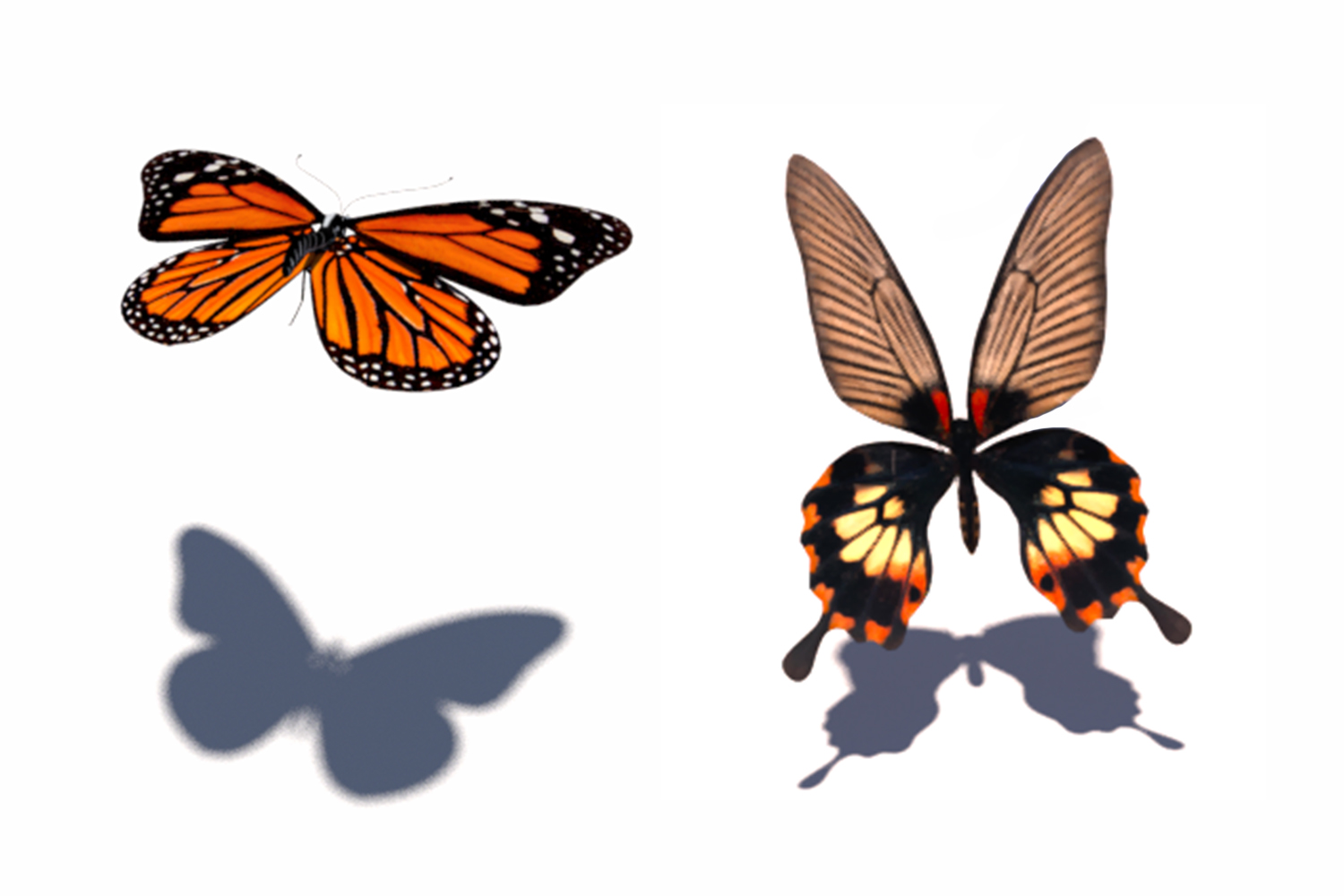
Flying Insect Modeling and Simulation
efficient and practical models to simulate insect flights and wing deformations such as butterflies

Large Scale Farm Scene Modeling
a scalable framework for large-scale farm scene modeling that utilizes remote sensing data, specifically satellite images.
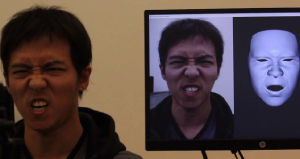
Video-based Facial Performance Modeling and Manipulation
automatic algorithms to real-time reconstruct 3D high-quality facial mesh sequences from video, as well as video-based facial expression manipulation and face swapping
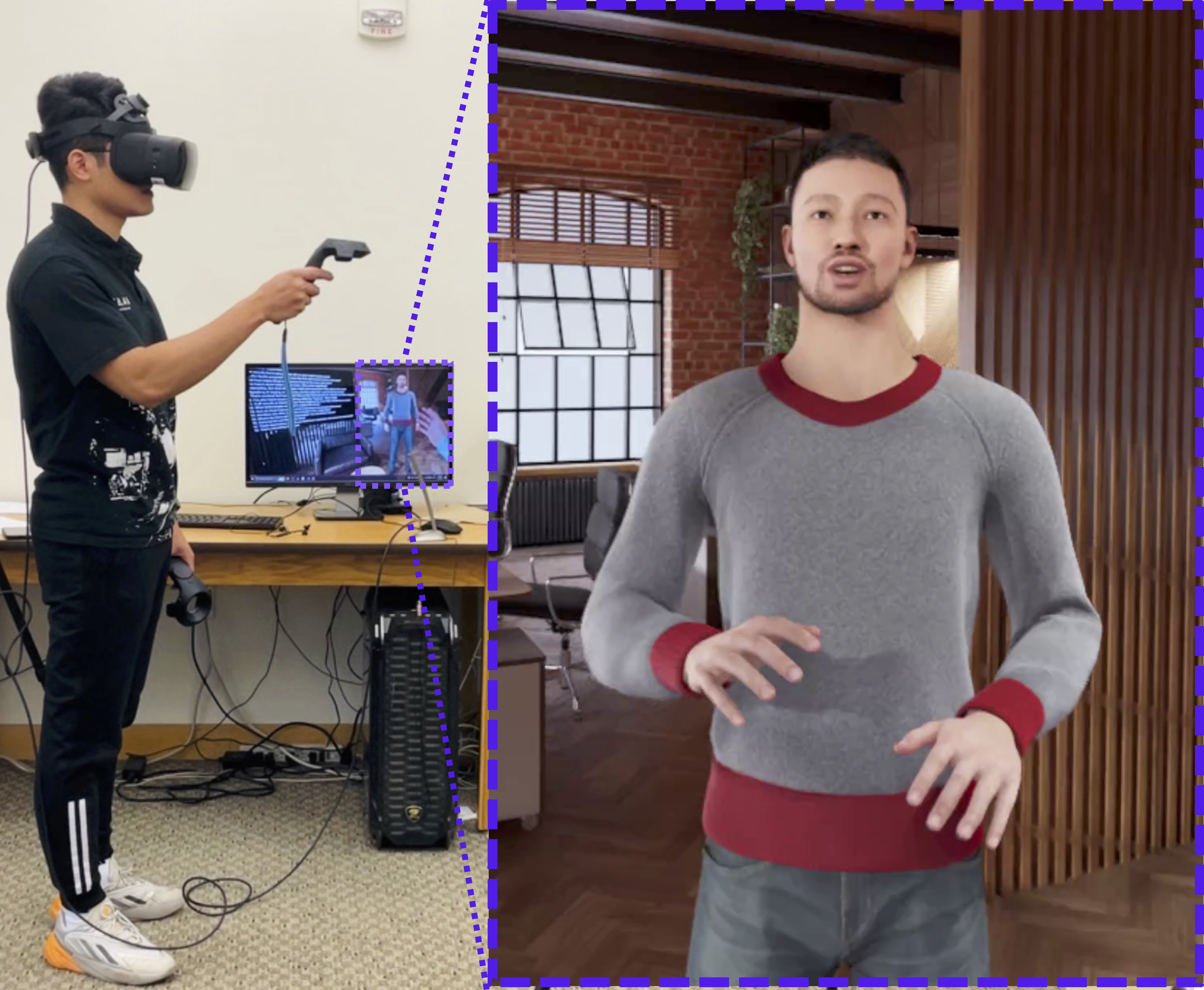
User-Aware Human-VR Interaction
a
learning-based multimodal agent behavior generation framework that adapts to users’ in-situ behaviors
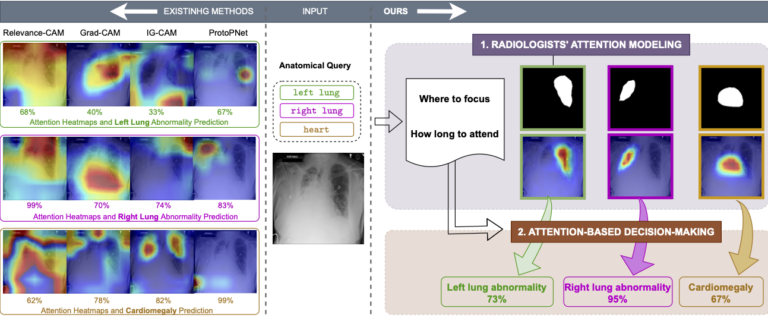
Human-AI Interaction for Medical Image Diagnosis
A computational framework for AI to collaborate with human radiologists on medical diagnosis tasks
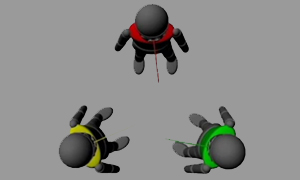
Analysis and Modeling Human Behaviors in Multiparty Conversations
quantifying, understanding, and modeling human behaviors and gestures when participants are involved with multiparty conversations
Papers:
CHI'17,
SCA'19 ,
PRESENCE'22 ,
MIG'22,
ICMI'23,
IVA'24,
ICMI'24,
ICMI'25a,
ICMI'25b
[ Video (SCA'19)],
[ Video (PRESENCE'22)],
[ Video (MIG'22)]
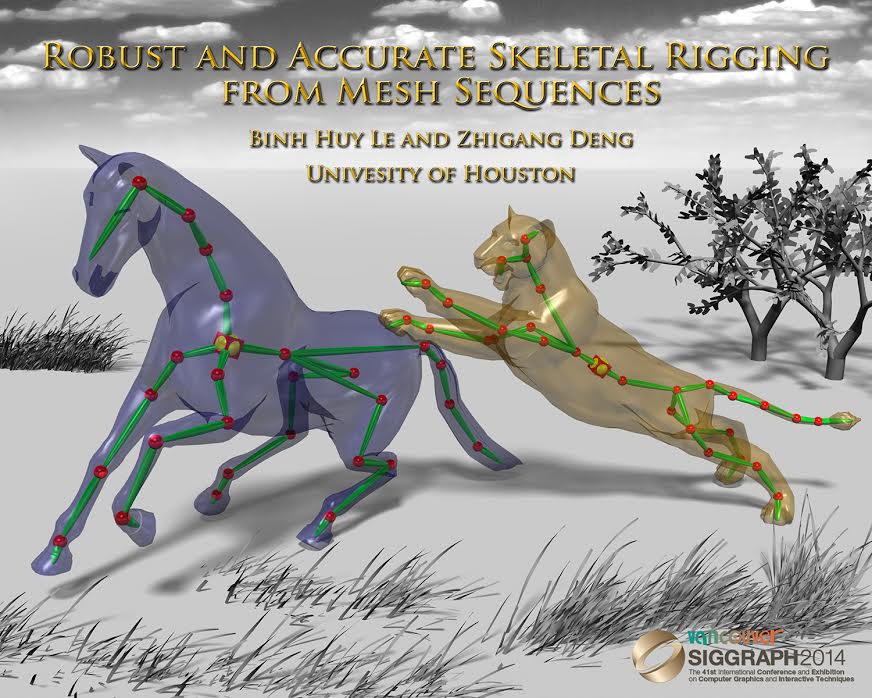
Skeletal Decomposition and Rigging from Mesh/Point Sequences
automatic algorithms to extract rigid bones or optimal skeleton structure from input mesh sequences or point clouds
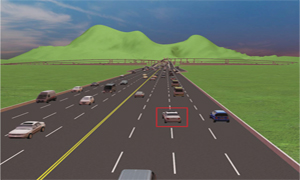
Visual Traffic Simulation, Modeling, and Evaluation
design of efficient algorithms and systems to simulate large-scale realistic traffic in various road and urban settings, including mixed traffic, lane-changing, simulated traffic evaluation, and intersectional traffic simulation.
Papers:
CAVW'14a,
CAVW'14b,
CAVW'15a,
CAVW'15b,
SCA'16,
TVCG'17,
TVCG'18a,
TVCG'18b,
CGF'19,
ICCV'19,
ECCV'20,
CAVW'22
[ Video (TVCG'17)],
[ Video (SCA'16)],
[ Video (TVCG'18b)]
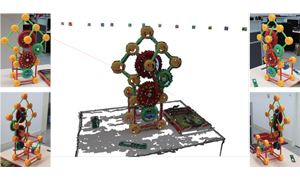
Interactive Object Modeling and Segmentation from Multi-view Images or RGB-D Input
design of novel interactive approaches to create high quality 3D models from multi-view image inputs or single RGB-D input.
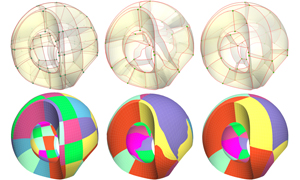
Hexahedral Mesh Generation, Optimization, and Evaluation
efficient algorithms to optimize the global structure of hex-meshes, generate hex-meshes, and evaluate the quality of hex-meshes
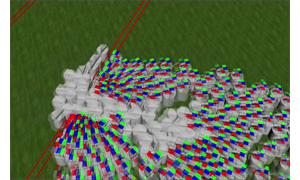
Crowd Simulation and Evacuation
new algorithms and systems to simulate crowds or group behavior in unexpected hazard situations, computational model of crowd emotion evolution, or simulated crowds by integrating physical strength consumption

Color Harmony Estimation and Modeling
Color composition (or color theme) is a key factor to determine how well a piece of art work or graphical design is perceived
by humans. We develop novel color theme evaluation models to infer both color theme ratings and user aesthetic preferences.
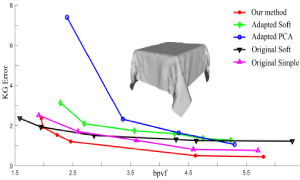
Mesh Animation Compression/Acceleration
efficient algorithms to compress mesh animation sequences through adaptive spatio-temporal segmentations in order to support progressive transmission over networks

Eye and Head Animations
data-driven synthesis algorithms for realistic and coordinated eye and head movements based on (live or pre-recorded) speech input
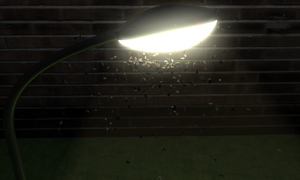
Insect Swarm Simulation
efficient algorithms to realistically simulate behavior patterns of a variety of insect swarms (including flying insects, ants, etc.) under various scenarios.
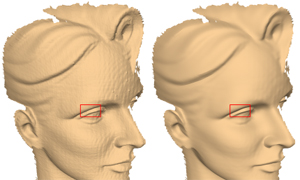
Feature-preserving Mesh/Points Denoising
effective algorithms for robust feature-preserving denoising for 3D mesh models or point clouds in order to remove noise while maximally preserving geometric features

Human Motion Compression, Retrieval, and Processing/Synthesis
effective algorithms for compressing and retrieving character motions, or data-driven human motion synthesis
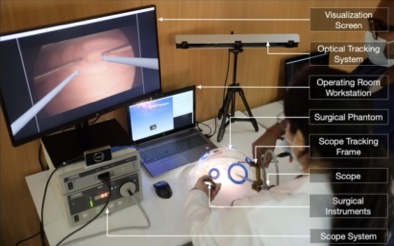
Tele-mentoring for Minimally Invasive Surgeries
design and development of a framework to facilitate tele‐mentoring between an operating surgeon and a remote surgeon for minimally invasive surgeries.
Papers:
MRCAS'21,
ISMR'22,
SEJ'22,
MRCAS'22,
BIBE'22b,
BIBE'22c,
SeGAH'23,
CBMS'23,
CMPB'24,
VR'25,
VR'25b

Visual-Haptic Interfacing for Robot-Assisted Minimally Invasive Cardiac Surgery
a novel human-in-the-loop, visual haptic interfacing system for planning and performing real-time MRI guided, robot-assisted, minimally invasive surgical interventions on the
beating heart, with particular focus on aortic valve implantations.
|
Other Projects
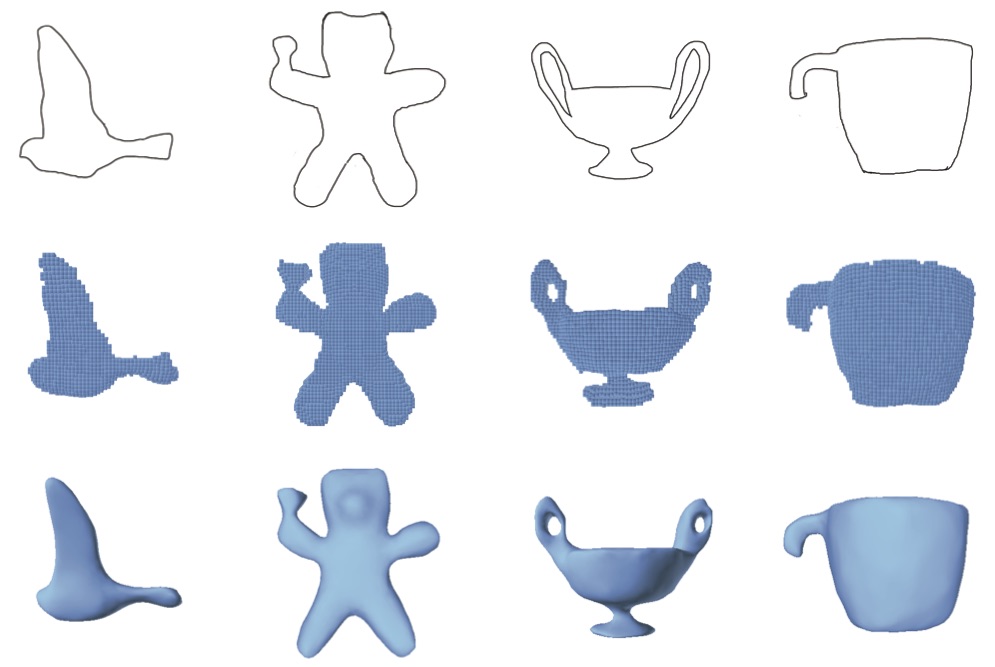
Sketch-based 3D Modeling
design of sketch-based modeling algorithms and systems to intuitive create 3D objects (including faces or generic objects) from a single sketch input
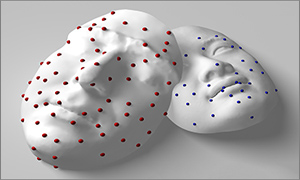
Effective Representations for Geometric Deformations
Algorithms to compute optimized marker layouts for facial motion acquisition/deformation and interactively construct cages for geometric deformation

Visual Speech Animation Synthesis
automated algorithms and systems to generate expressive visual speech animations based on novel typed or spoken input
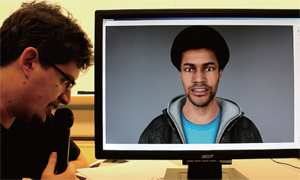
Live Speech Driven Facial Animation
fully-automated algorithms to generate realistic lip-sync and head-and-eye animations based on live speech input alone
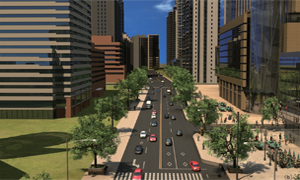
Creative Virtual Tree Modeling and Morphing
efficient algorithms to generate a set of morphologically diverse and inspiring virtual trees through hierarchical topology-preserving blending and to morph between two distinct trees

Perceptually Guided Facial Animation
perceptually guided computational algorithms to generate expressive facial animation, and quantitatively evaluate visual speech animation

Blendshape Facial Animation
algorithms for automating or reducing time-consuming tuning efforts of the blendshape animation approach, including target interference reducing, cross-model mapping, and model construction
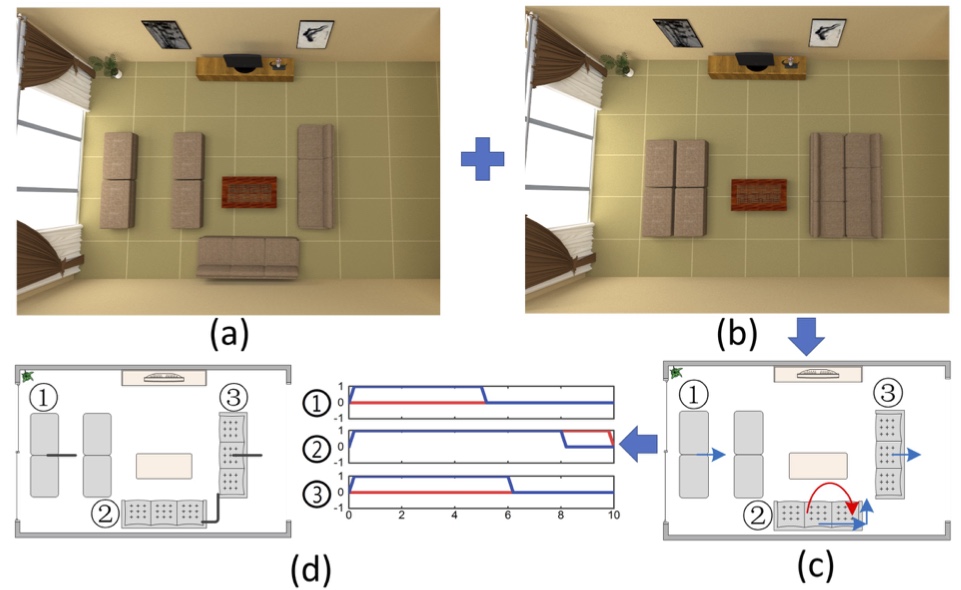
Indoor Layout Modeling and Generation
automated methods to synthesize plausible indoor scene layouts, including motion planning for convertible indoor scene layout design and layout programming via virtual navigation detectors

Facial Animation Editing and Transferring
efficient and automated algorithms and systems for editing and transferring facial motions across different models or modalities, with intuitive and little user interaction

Group Formation Generation for Agent-based Simulation
efficient approaches to generate arbitrary and precise group formations for agent-based simulations given user-specified inputs (like sketches or 2D images)

Context-Aware Motion Diversification and Perception for Crowds
a novel scheme for dynamically controlling motion styles of agents to increase the motion variety of a crowd

Energy-efficient GPU and Mobile Graphics Computing
Design of novel algorithms to statistically model and predict the power consumption of GPU-based computing, and perform in-depth quantitative analysis on the power consumption and runtime performance aspects of graphics computing and applications on mainstream smartphone devices

User-centric Interfaces for Mobile or Immersive Computing
design various user-centric user interfaces for mobile computing, including an automated avatar interface is driven by the text messages, as well as single-handed mobile keyboard design

Improving Gaming Experience by Incorporating Physiological Feedback and Gamers' Profiles
novel methodology to improve users' gaming experience by real-time monitoring their physiological signals or their individualized gamer profile, and thus automatically adjusting the difficulty level of computer games
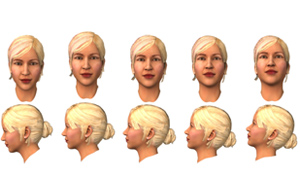
Perceptual Understanding of Synthetic Facial Expressions, Animations, and Head Motion
study the region-significance and culture-dependence of facial expressions and movements, in terms of subject identification, emotion perception of 3D facial expression, and visual perception of avatar head movements
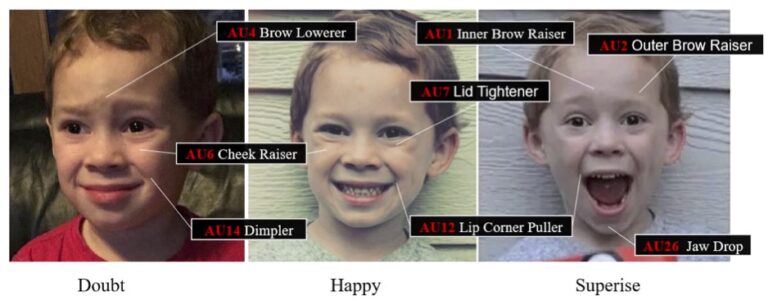
Mutimodal Emotion Recognition
comprehensive analysis and understanding of the strengths, limitations, and combinational aspects of multimodal emotion recognition algorithms and system, and extract dynamic facial expressions or emotion information from video or acoustic signals.

Spine Tracking and Segmentation in Neuron Images
automated algorithms to accurately track, detect, segment a large number of dentrite spines from time-lapse confocal microscopy neuron images, in both 2D image level and reconstructed 3D geometric level
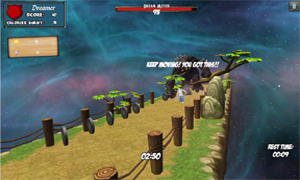
Self-represented Avatars for Teen Physical Activities
study the feasibility and effectiveness of using self-represented avatars for increasing teen physical activities

Visualization and Planning of Neurosurgical Interventions
highly efficient, GPU-accelerated visualization and planning techniques to allow interactive, quantitative or semi-quantitative comparison among various points of entrance for neurosurgical procedures that require straight access
|





















































